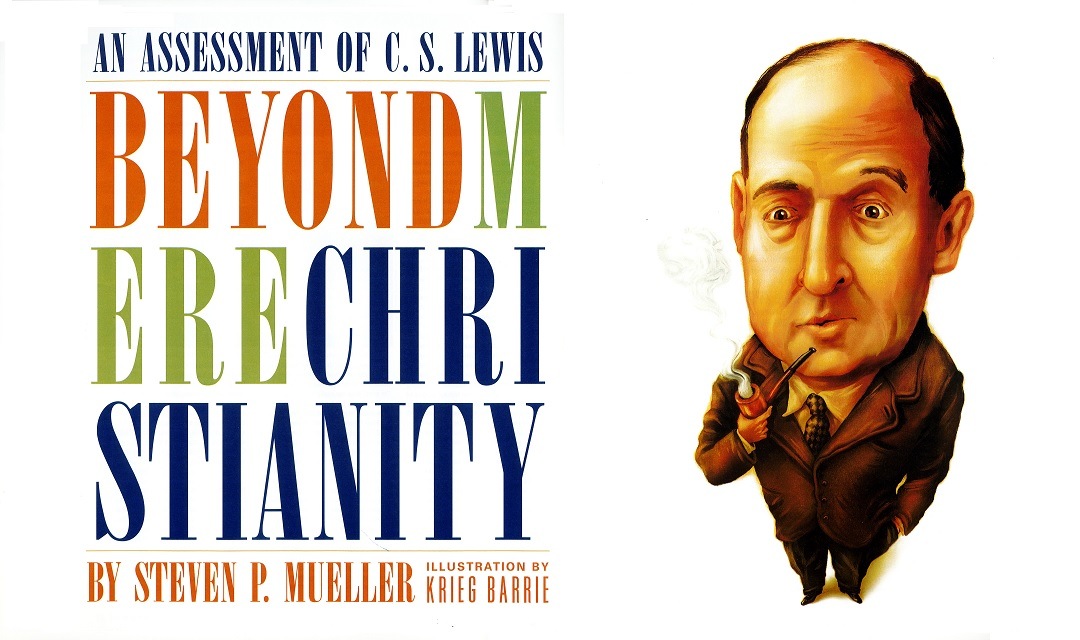This article first appeared in the Christian Research Journal, volume 27, number 4 (2004). For further information or to subscribe to the Christian Research Journal go to: http://www.equip.org
SYNOPSIS
C. S. Lewis was one of the most influential Christian apologists of the twentieth century, and he remains influential today. His apologetic works explain essential Christian teachings in ordinary, nontechnical language, and his writings usually focus on beliefs that all Christians hold in common— what he called “mere Christianity.” He thought this approach would best serve those who did not know Jesus Christ. Once they came to faith, Lewis believed, they would learn about theological differences between churches and join a Christian fellowship of their choosing.
Lewis claimed to have limited his apologetic writings to mere Christianity; however, there were times when he addressed teachings that are not held by all Christians. He believed, for instance, that Scripture is in some sense the word of God, but he questioned its inerrancy. He also believed in the existence of purgatory, though he did not consider it to be a place of punishment. Lewis, rather, believed saved people were purified of their sins in purgatory before entering heaven itself. Another controversial belief he held was that a person could belong to Jesus Christ and be saved without necessarily knowing Him specifically. This is not exactly universalism, but it goes beyond the clear teaching of Scripture.
A full consideration of Lewis needs to include his strengths and his weaknesses. A discerning reader can recognize that many of his writings and strategies are helpful and are a valuable contribution to apologetics and theology while also recognizing that some of his teachings go beyond the scope of mere Christianity.
C. S. Lewis (1898–1963) is often called the foremost Christian apologist of the twentieth century. His many writings have introduced countless people to the Christian faith. Apologetic works such as Mere Christianity, Miracles, and The Problem of Pain explain and defend essential beliefs of Christianity. Children’s stories from the Chronicles of Narnia recast biblical themes, enabling readers to consider them from new perspectives. Popular books, such as The Screwtape Letters, have given many people ample material for thought and reflection.
Lewis believed that theology should be accessible to any Christian who was willing to read and think. His clear, concise writing addresses significant theological issues and invites the reader to explore a greater depth of faith. Consequently, many Christians from a variety of denominational backgrounds note Lewis’s influence on their own conversion and understanding.
In the decades since his death, Lewis’s books have remained popular, but they are not without their critics. Some from outside of Christianity dislike his works because of their biblical message, but critical voices have emerged from within Christianity as well.
When a reader encounters a description of Christianity that resonates with his or her own understanding, that reader may conclude that the writer shares his or her theological perspective. Further reading, however, may reveal some surprising contrasts. Lewis’s readers are often confused by unexpected teachings in his books. How should one respond to a writer who shared some remarkable insights but who also presented some questionable teachings?
Some readers consider any critical assessment of Lewis to be inappropriate, not wanting a champion of Christian outreach to be disparaged. This concern is legitimate. Lewis’s significant accomplishments should not be overlooked, but the opposite error is equally troublesome. Concealing or ignoring his shortcomings does no service to Lewis or the truth he defended. Lewis was not an inerrant writer, nor was he the ultimate theological authority. He was a human being who made a significant contribution, but his writings contain some flaws. A legitimate assessment of Lewis must account for both.
LEWIS’S APOLOGETICS
Lewis offered a diverse yet consistent presentation of Christianity. Through many literary genres (types) and in a variety of settings, he winsomely presented his faith to a modern audience. Though raised in a Christian home, Lewis abandoned his faith at a young age and became a self-professed atheist. He had many objections to Christianity and did not return to it until these objections were answered satisfactorily. With those answers, he answered the objections of others. His writings, therefore, focus on the most essential teachings of Christianity and on obstacles that unbelievers often face.
Some of these obstacles are addressed in his apologetic works: Is there a universal moral law? If so, must there also be a universal moral lawgiver? Is the universe a closed system, or is supernatural intervention possible? Is it logical to consider Jesus to be a good ethical teacher while denying His deity? Can miracles really occur? How can an omnipotent God allow suffering and still be good? Lewis addressed such questions with candor and ease.
He, moreover, “translated” theology into ordinary speech, making it more intelligible to laypeople. Part of the reason Lewis was able to do this is because he was a layman. He did not make his living from religious writing but from his secular professorship. This “outsider” status helped make him a more engaging and effective writer.
Another factor contributing to Lewis’s effective apologetic was his diverse style. Lewis used every avenue available to him to present his faith. His nonfiction books directly address theological issues. Likewise, his fictional works present significant religious themes. His speeches, essays, and letters show that his faith was an essential part of his life. Even his academic works present Christian themes when they are appropriate to the subject at hand. Lewis used his entire life as a platform for sharing his belief in Christ.
The Common Hall
Much of the success of C. S. Lewis’s apologetics, and his writing in general, lies in its focus. Lewis knew how to precisely delineate a topic and focus his writing. This precise focus is evident throughout his works. In the preface to Mere Christianity, Lewis explicitly noted his purpose: “The best, perhaps the only, service I can do for my unbelieving neighbours [is] to explain and defend the belief that has been common to nearly all Christians at all times.”1 He decided not to discuss differences between denominations or attempt to convert anyone to his own Anglican faith. Instead, he presented the basic teachings of orthodox Christianity — teachings he labeled “mere Christianity.”
Lewis had three motives for this focus: First, he believed that the disputed doctrines required a depth of theological and historical understanding that he did not possess. He humbly considered others better qualified to discuss such topics. Second, Lewis said that this type of writing, while important for those who are already Christians, would not bring unbelievers into the church. His goal was not to persuade those who were debating which denomination to join or which congregation to attend; rather, he wrote for those who did not know Jesus Christ. Third, he noted that many writers already addressed the controversial points, but few focused on the basics.2
This emphasis on common teachings makes Lewis quite appealing. Nonbelievers find that he presents the central beliefs of Christianity clearly. Christians generally find significant agreement with his presentation. Many readers, unfortunately, do not take to heart what Lewis said about the limits of his approach:
I hope no reader will suppose that “mere” Christianity is here put forward as an alternative to the creeds of the existing communions — as if a man could adopt it in preference to Congregationalism or Greek Orthodoxy or anything else. It is more like a hall out of which doors open into several rooms. If I can bring anyone into that hall I shall have done what I attempted. But it is in the rooms, not in the hall, that there are fires and chairs and meals. The hall is a place to wait in, a place from which to try the various doors, not a place to live in. For that purpose the worst of the rooms (whichever that may be) is, I think, preferable.3
The “common hall” of Christianity — the teachings and practices shared by all Christians — is not the end. Christians should rejoice in this commonality but not overlook the significant challenges that remain. Lewis encouraged those who have entered the common hall to seek a “room” where true doctrine and holiness may be found, but he gave little counsel on which room to choose. He left that task to others. He did, however, caution Christians to be charitable toward those who dwell in other rooms and those who had not yet found a room of their own.
Challenges of the Common Hall
Lewis’s common hall is a helpful illustration of the common faith of the church, but it is accompanied by two challenges. First, who determines what is common to all Christians? No individual Christian can express what is common only in terms of his or her church or his or her own particular beliefs. Lewis, consequently, was careful to note that his definition of mere Christianity was not intended to be a summary of Anglicanism (though Anglican influences on Lewis’s work are evident), nor was it meant to be a complete summary of his own faith. Some (including myself) have suggested that the ecumenical creeds comprise a summary of essential Christianity, yet not all Christians formally acknowledge the creeds. It may be simply that each reader has his or her own definition of mere Christianity through which he or she evaluates Lewis’s words; but, if the definitions vary, does a common hall truly exist?
It is clear, moreover, that not all Christians share Lewis’s beliefs on certain points. We will consider three of them: the authority of Scripture, the existence of purgatory, and the inclusivity of salvation. Lewis addressed other issues that are disputed by Christians as well, such as the nature of Christ’s atonement, the existence of human free will, the depravity of fallen humanity, principles of Christian behavior, and the possibility of evolution.4
If Christians can overcome this first challenge, and I believe they can, they will likely face a second problem. Lewis wrote about the need to find a proper church, yet some of his readers seem hesitant to do this. In this ecumenical age, many are reluctant to make any commitment to a confession or a congregation. They seem satisfied with the common hall without “fires and chairs and meals.” Such complacency is not the result Lewis had in mind.
BEYOND THE COMMON HALL
Despite these challenges, Lewis’s presentation of basic Christian teaching is powerful and effective, and his description of Jesus Christ is biblical and compelling to his readers. At times, however, Lewis addressed topics that are controversial among Christians. We will now consider three of these forays beyond mere Christianity.
Is Scripture Inerrant?
Attracted by Lewis’s clear presentation of Christianity, readers often are surprised when they discover Lewis’s assessment of the Bible. He discussed questions such as: What does it mean for Scripture to be “inspired by God” (2 Tim. 3:16)? Is it true and trustworthy? At first glance, readers may assume that Lewis had a high view of Scripture. He had said that the Gospels were not myths.5 He had been critical of those who reject supernatural elements of Scripture and had observed that modern theologians often base their conclusions on naturalistic assumptions instead of the biblical text.6 Further reading, however, calls his own view into question:
I have been suspected of being what is called a Fundamentalist. That is because I never regard any narrative as unhistorical simply on the ground that it includes the miraculous. Some people find the miraculous so hard to believe that they cannot imagine any reason for my acceptance of it other than a prior belief that every sentence of the Old Testament has historical or scientific truth. But this I do not hold, any more than St. Jerome did when he said that Moses described Creation “after the manner of a popular poet” (as we should say, mythically) or than Calvin did when he doubted whether the story of Job were history or fiction.7
Lewis believed that “all Holy Scripture is in some sense — though not all parts of it in the same sense — the word of God.”8 The book of Job, for instance, lacking historical details and context, appeared to Lewis to be unhistorical. The idea that the creation account in Genesis was derived from earlier mythical and pagan accounts did not trouble Lewis. These earlier stories were retold and modified (whether consciously or unconsciously) until they became an account of “true Creation and of a transcendent Creator.” When this happens in Genesis, Lewis concluded, there is no reason to “believe that some of the re-tellers, or some one of them, has not been guided by God.”9 In Lewis’s thought, Genesis conveys divine truth but not necessarily scientific or historical truth; still, God reaches us through its message.
In this same way, all Scripture, written in many literary styles, and for different purposes, may all be “taken into the service of God’s word.”10 Whether it was produced by poets, by the Jewish community, by early Christians, whether modified by redactors (revisors) and editors, Lewis concluded, “On all of these I suppose a Divine pressure; of which not by any means all need have been conscious.”11
In a personal letter, Lewis raised other issues that he thought were difficulties in the doctrine of inspiration, including inconsistencies in the genealogies in Matthew and Luke, inconsistencies in the account of the death of Judas, the admitted unhistorical nature of parables (which he believed may extend also to the stories of Job and Jonah), and Luke’s admission that he conducted research on his Gospel.12 Lewis concluded that because of this:
The total result is not “the Word of God” in the sense that every passage, in itself, gives impeccable science or history. It carries the Word of God and we (under grace, with attention to tradition and to interpreters wiser than ourselves and with the use of such intelligence and learning as we may have) receive that word from it not by using it as an encyclopedia or an encyclical but by steeping ourselves in its tone and temper and so learning its overall message.13
Similarly, he wrote, “That the over-all operation of Scripture is to convey God’s Word to the reader (he also needs inspiration) who reads in the right spirit, I fully believe. That it also gives true answers to all the questions (often religiously irrelevant) which he might ask, I don’t. The very kind of truth we are often demanding was, in my opinion, not even envisaged by the ancients.”14 Indeed, Lewis considered this challenge of Scripture to be an asset: understanding God’s Word requires not only the intellect but also the entire person.
Lewis clearly believed Scripture has authority and communicates God’s word, but his grounding of that authority is confusing to many. On this point, Lewis, who was ordinarily objective in his theological understanding, added a layer of subjectivity. If Scripture only in some sense is the word of God, then in some sense it is not. Parts of it are trustworthy; others must be less so. The problem such a view creates is, how is the Christian to decide which part to trust? If all Scripture can be the word of God but not communicate truth, then inspiration is of little practical consequence.
Lewis’s statements may frustrate Christians who hold that Scripture is inerrant. One wishes that Lewis had taken more time to examine other apologetic responses to his objections against inerrancy, but the message of his writings remains clear. Lewis did not believe in an inerrant Bible, though he did believe that Scripture was in some sense inspired. Some have tried to harmonize Lewis’s words with biblical inerrancy and infallibility; unfortunately, this attempt is futile.
Purgatory
Many readers are willing to overlook Lewis’s view on Scripture; by contrast, it is likely that no controversial issue catches the Protestant eye more quickly than the topic of purgatory. Many readers first encounter this teaching in The Great Divorce where, in a fictional context, the damned are allowed a brief respite from their suffering to travel to the fringes of heaven. There Lewis showed the choices that they made in their earthly lives and demonstrated that their own rejection of God’s grace had damned them. In Lewis’s narrative, one of the damned spirits is told that if he doesn’t return to hell, that place can be called purgatory.15
Lewis’s nonfiction confirms his belief in purgatory. One of the clearest examples is in Letters to Malcolm: Chiefly on Prayer where Lewis wrote, “I believe in Purgatory. Mind you, the Reformers had good reasons for throwing doubt on ‘the Romish doctrine concerning Purgatory’ as that Romish doctrine had then become.”16 The phrase, “Romish doctrine,” comes from the Anglican Articles of Religion, which reject the “Romish doctrine of purgatory.” Instead of the Romish doctrine, which sees purgatory as a place of punishment for sins, Lewis considered purgatory to be a place of purification. Souls in purgatory are saved, but they are not yet pure enough to enter heaven. Lewis suggested that “our souls demand Purgatory.”17 It is neither a second chance for salvation nor an outpouring of divine wrath over sin. Instead, Lewis viewed it as a purification of the sinner, or a completion of the work of redemption.
This view is also found in Mere Christianity where Lewis discussed what Jesus meant when he told people to “count the cost” before becoming Christians. Lewis paraphrased Jesus, saying, “If you do not push me away, understand that I am going to see this job through. Whatever suffering it may cost you in your earthly life, whatever inconceivable purification it may cost you after death, whatever it costs Me, I will never rest, nor let you rest, until you are literally perfect — until My Father can say without reservation that He is well pleased with you, as He said He was well pleased with me.”18
More personally, Lewis pondered purgatory at the death of his wife, saying, “I never believed…that the faithfulest soul could leap straight into perfection and peace the moment death has rattled in the throat.”19 Just weeks before his own death, Lewis wrote to a friend, “When you die, and if prison visiting is allowed, come down and look me up in Purgatory.”20
Lewis provided an articulate description of purgatory, but clear articulation does not make it true. Lewis consistently presented a doctrine that is not grounded in Scripture. It makes some logical sense that a religion would call for the purification of the sinner after death; nevertheless, this belief has no biblical warrant. Indeed, it detracts from the work of Christ. Scripture notes that the blood of Jesus purifies us from all sins (1 John 1:7), whereas Lewis reserved some of the believer’s purification for purgatory. Jesus assured believers that their souls go immediately to heaven (Luke 23:43), whereas Lewis doubted this.
Was Lewis a Universalist?
A third departure from mere Christianity is found near the end of his fictional work The Last Battle. Lewis offers the account of Emeth, a Calmorene soldier who spent his life in service to the false god, Tash. When the world of Narnia comes to its final end, Emeth finds himself in King Aslan’s country before the Lion (Aslan) Himself. Emeth kneels before Aslan, expecting to be judged and executed, but Aslan welcomes him. Confused, Emeth asks if Aslan and Tash are names for the same God. Aslan emphatically asserts that He and Tash are opposites, and explains why Emeth has been saved.
I take to me the services which thou hast done to him, for I and he are of such different kinds that no service which is vile can be done to me, and none which is not vile can be done to him. Therefore if any man swear by Tash and keep his oath for the oath’s sake, it is by me that he has truly sworn, though he know not, and it is I who reward him. And if any man do a cruelty in my name, then though he says the name Aslan, it is Tash whom he serves and by Tash his deed is accepted.21
The passage above parallels a description of the acts of unbelievers in Mere Christianity:
There are people in other religions who are being led by God’s secret influence to concentrate on those parts of their religion which are in agreement with Christianity, and who thus belong to Christ without knowing it. For example, a Buddhist of good will may be led to concentrate more and more on the Buddhist teaching about mercy and to leave in the background (though he might still say he believed) the Buddhist teaching on certain other points. Many of the good Pagans long before Christ’s birth may have been in this position.22
Many readers who encounter these words are stunned. Some read these words to mean that Lewis is a universalist (universalism is the view that everyone will be saved). If a follower of Tash or a Buddhist can be saved, then this must logically mean that everyone must be saved. This, however, was not Lewis’s position.
A closer examination of the Chronicles of Narnia shows that Lewis was not a universalist. Emeth does, indeed, arrive in Aslan’s country, but all those who were truly serving Tash pass into Aslan’s shadow. This damnation is irreconcilable with universalism; if some are damned, then not all are saved. The passage in Mere Christianity, while holding out hope for a righteous pagan, also notes that many do not belong to Christ — even those who call themselves Christians may really be unbelievers. Throughout his writings, Lewis consistently maintained that hell exists. He explained in The Great Divorce, “There are only two kinds of people in the end: those who say to God, ‘Thy will be done,’ and those to whom God says, in the end, ‘Thy will be done.’ All that are in Hell, choose it. Without that self-choice there could be no Hell.”23 Lewis explicitly denied universalism. When a reader asked why Lewis disagreed with George MacDonald on universalism, Lewis answered, “I parted company from MacDonald on that point because a higher authority — the Dominical utterances themselves — seemed to me irreconcilable with universalism.”24
Lewis was not a universalist; nevertheless, his description of salvation lacks biblical support. Lewis said salvation is through Jesus Christ our Lord but also asserted that a person might belong to Christ without realizing it or explicitly knowing Him. The only way to the Father is through the Son, but “we do not know that only those who know Him can be saved through Him.”25 In other words, there can be anonymous Christians. It appears that here the medieval conception of the “righteous pagan” influenced Lewis. The passage from Mere Christianity describes such “good pagans” who may have belonged to Christ. Elsewhere, Lewis suggested Akhenaten, Plato, and Virgil as examples of righteous pagans.26
The problem with Lewis’s presentation is that he gives a specific answer about these cases without clear biblical support. God certainly can do whatever He pleases, and He alone sees and judges the heart, but Lewis’s speculation on this topic goes beyond God’s clear revelation. It is particularly disturbing that he did this in a children’s story. The story of Emeth would have been no less compelling if Emeth had known and loved Aslan while his countrymen served Tash. Lewis did not present universalism, but through speculation he did cloud the issue of salvation.
WHAT ARE WE TO MAKE OF LEWIS?
Lewis wanted to present those aspects of the Christian faith that are common to all Christians. Many Christians accept and welcome those writings in which he did this. At times, however, he drifted from this focus to address topics that are not really part of mere Christianity. Some find these wanderings too far from orthodoxy and shun his work entirely. This reaction may be understandable, but they miss useful biblical material in the rest of his writings. Others may be so enamored with Lewis that they are willing to excuse or even embrace his theological errors. Embracing error, however, makes Lewis superior to Scripture. Is there a mediating view that can use the best of Lewis without embracing his errors?
The solution lies in Lewis’s own description of Christianity. For the most part, he described the common hall — shared teachings. Sometimes, however, he spoke about his own room — a theology that is not universally believed. We can recognize his work for what it is, and, without accepting as true everything he wrote, make use of that which is commonly held.
We must read Lewis, and any human author, with an awareness of human fallibility. Lewis’s works are helpful and insightful, but they are not part of Holy Scripture. They need to be subject to the authority of God’s inspired Word. Was Lewis perfect? No, but he wrote many useful things. He had some inconsistencies, but in the end, he proclaimed the crucified and resurrected Savior to a world that needs the gospel.
What are we to make of Lewis? Perhaps we might heed his counsel in his description of the common hall and the rooms that make up Christianity: “When you have reached your own room, be kind to those who have chosen different doors and to those who are still in the hall. If they are wrong they need your prayers all the more; and if they are your enemies, then you are under orders to pray for them. That is one of the rules common to the whole house.”27
Lewis no longer needs our prayers, but we can still be gracious to the memory of one who has helped many to find the common hall. With careful use, his words can continue to be a blessing to many others.
NOTES
- C. S. Lewis, Mere Christianity (New York: Macmillan, 1960), 6.
- Ibid.
- Ibid., 11–12.
- See Mark A. Noll, “C. S. Lewis’s ‘Mere Christianity’ (the Book and the Ideal) at the Start of the Twenty-first Century,” Seven 19 (2002): 36–37.
- C. S. Lewis, Surprised by Joy: The Shape of My Early Life (New York: Harcourt Brace Jovanovich, 1955), 236.
- See C. S. Lewis, “Modern Theology and Biblical Criticism,” Christian Reflections (Grand Rapids, MI: Eerdmans, 1982), 152–66. This essay is also called “Fern-Seed and Elephants.”
- C. S. Lewis, Reflections on the Psalms (New York: Harcourt Brace Jovanovich, 1958), 109.
- Ibid., 19.
- Ibid., 110–11.
- Ibid., 111.
- Ibid.
- W. H. Lewis, ed., Letters of C. S. Lewis (New York: Harcourt Brace Jovanovich, 1966), 186–87.
- C. S. Lewis, Reflections, 112.
- W. H. Lewis, Letters of C. S. Lewis, 287.
- C. S. Lewis, The Great Divorce (New York: Macmillan, 1946), 39.
- C. S. Lewis, Letters to Malcolm: Chiefly on Prayer (New York: Harcourt Brace Jovanovich, 1964), 108.
- Ibid.
- C. S. Lewis, Mere Christianity, 172.
- C. S. Lewis, A Grief Observed (New York: Bantam, 1976), 49.
- W. H. Lewis, Letters of C. S. Lewis, 307.
- C. S. Lewis, The Last Battle (New York: Macmillan, 1956), 165.
- C. S. Lewis, Mere Christianity, 176–77.
- C. S. Lewis, The Great Divorce, 72.
- David Mills, ed., The Pilgrim’s Guide: C. S. Lewis and the Art of Witness (Grand Rapids, MI: Eerdmans, 1998), 253.
- C. S. Lewis, Mere Christianity, 65.
- C. S. Lewis, Reflections, 89, 108.
- C. S. Lewis, Mere Christianity, 12.









